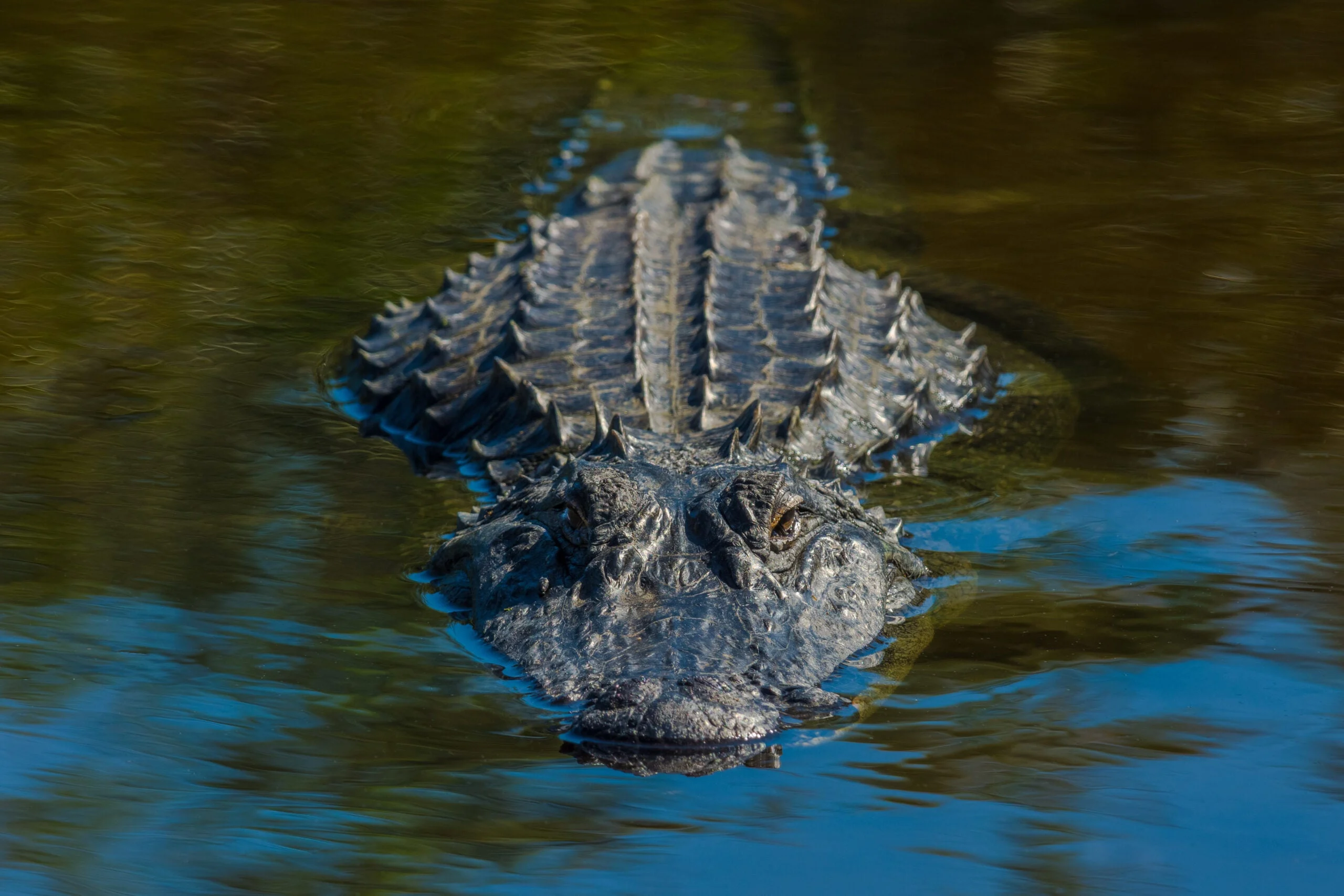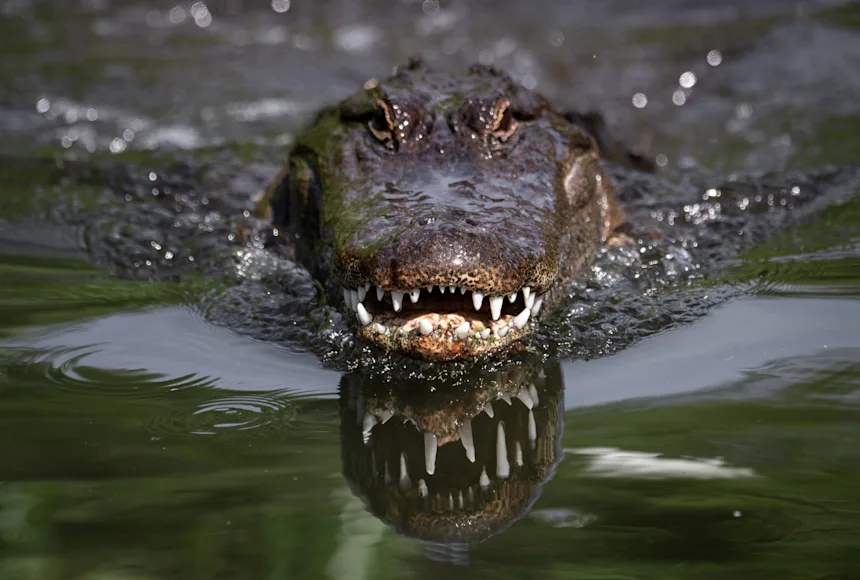The vast expanse of the American wetlands paints a picture of serenity and untouched beauty. Yet, beneath this surface exists a world teeming with life and animals worthy of our respect. The American alligator
, a living dinosaur, stands prominently as one of the most awe-inspiring inhabitants of these wetlands. These creatures, with their armor-like skin, razor-sharp teeth
, and powerful tails, have become emblematic of nature’s wild, untamed essence.
However, as much as they are revered, it’s essential to approach these creatures with a healthy dose of respect and caution. Contrary to popular misconceptions, not every alligator one might come across is out for blood. Most prefer to steer clear of human interactions. Nevertheless, it’s the unpredictability of wild creatures that necessitates preparedness. While the likelihood of facing an aggressive alligator is minimal, ignorance can often be our greatest enemy. By understanding alligators’ behaviors, territories, and triggers, we learn the necessary measures to know how to survive an alligator attack.
**Read Next: What Does Alligator Taste Like?
**
How Common Are Alligator Attacks?
While it’s important to know how to survive an alligator attack, you should also know that alligator attacks
are relatively rare. There are only a handful of reported incidents annually in the U.S., mainly in Florida, with the largest alligator population—estimated at 1.3 million. Many of these incidents are non-fatal, resulting in minor injuries. However, rarity shouldn’t lull one into a false sense of security. Like any wild animal, alligators can be unpredictable.
**Watch: Alligator Attacks Swimmer in Florida
**

If you discover that you’re in gator-infested waters, get out as quickly, and quietly, as you can. Adobe Photostock
What Causes Alligator Attacks?
The first thing to understand before learning how to survive an alligator attack is that they can often be attributed to a variety of behaviors and circumstances. One predominant cause is territorial behavior, especially during mating seasons when male alligators become more aggressive. The mating season typically starts with courting in April; the breeding season is from May to June. Avoiding these animals during this season will help you avoid their possible alligator attack due to mating season craziness. Their dominance displays can sometimes be mistaken for aggression, leading to confrontations. Take note of these standard displays to know what you see and avoid these animals at all costs, as they are trying to tell you to stay away.
Head Slaps and Jaw Claps: An alligator might slap the water’s surface with its head or snap its jaws together loudly. These actions can be warning signs to intruders or potential rivals.
Bellowing: Male alligators produce deep, resonant bellows, especially during the mating season. These vocalizations can be heard long distances to attract potential mates and warn off other males. During this display, the alligator will often inflate its lungs, raising its body off the water’s surface, and produce a series of rumbles.
Body Posturing: An alligator trying to assert dominance might arch its back and raise its head and tail above the water. This posture makes the alligator appear larger and more intimidating.
Tail Thrashing: An agitated or threatened alligator might thrash its tail in the water, producing splashes. This is another display to warn off potential threats.
Snout and Head Raise: An alligator may lift its snout and head above the water or ground level, often combined with open-mouth threats. This can indicate dominance or a warning to potential rivals to back off.
Physical Combat: When displays do not resolve conflicts, especially during the breeding season, male alligators might engage in physical combat. This can involve biting, body slamming, or attempts to push and submerge each other.
Another significant factor is feeding. Alligators that are fed by humans—intentionally or not—begin to associate humans with food. This can lead to these reptiles approaching people with the expectation of a meal, heightening the risk of an attack.
Additionally, female alligators are fiercely protective mothers. They aggressively defend their nests and will not hesitate to confront anything they perceive as threatening their young. Furthermore, there are instances of accidental encounters where unsuspecting humans enter waters or areas close to where alligators are present. The natural camouflage of these reptiles allows them to blend seamlessly with their surroundings, making it easy for a person to overlook their presence, leading to close encounters unintentionally. If you want to know how to survive an alligator attack, it’s always imperative to be cautious and aware when you’re in their territory.
What to Do if an Alligator Chases You?
If you are close to an alligator on land, your best option is to turn and run as fast as possible in the opposite direction. A prevalent myth suggests that alligators can outrun humans over short distances or that zigzagging can confuse them. However, the reality is that running in a straight line away from the threat is your safest bet. An alligator’s primary advantage is not its speed on land but its agility and prowess in the water.
Contrary to their land-based limitations, alligators are swift and efficient swimmers. If you’re unfortunate enough to be in the water when you notice an approaching alligator, it’s crucial to remain calm. Swiftly, yet quietly, make your way to the nearest shore. Panicking or causing a commotion can potentially attract more attention from the predator. The key is to put distance between you and the alligator, using the environment to your advantage whenever possible.
How to Fight an Alligator?
When defending yourself against an alligator, it’s important to remember that such a confrontation should always be a last resort. The sheer power and predatory nature of alligators make them formidable adversaries. If you find an alligator has latched onto you or is threateningly close, a few defensive actions can be taken if you want to survive an alligator attack.
First, targeting the eyes could be effective, as they are among the reptile’s most sensitive areas. Gouging or poking them might force the creature to release its grip, giving you a window to escape. Additionally, the snout, particularly its tip, is another vulnerable spot. A forceful strike to this region can also deter the alligator. However, if you find yourself caught in the vice-like grip of an alligator’s jaws, it’s essential to note that attempting to pry them open is futile. While their bite force is among the most powerful in the animal kingdom, the muscles that open their jaws are surprisingly weak. But given the circumstances, forcing them open would likely prove ineffective and waste precious time. Your focus should be targeting their vulnerabilities and finding an opportunity to distance yourself.
FAQs
What to do if an alligator attacks you.
In the unfortunate event that an alligator does attack, your immediate reaction can make a significant difference. Aggressively defending yourself is paramount. Targeting the alligator’s most vulnerable points—the eyes and the snout—is advisable. By focusing on these sensitive areas, there’s a higher chance of compelling the creature to release its hold. In such harrowing situations, drawing attention to yourself can also be beneficial. Making loud noises might deter the alligator and alert nearby individuals who could come to your aid.
What is the best defense against an alligator?
When it comes to knowing how to survive an alligator attack, prevention is always superior to confrontation. Awareness of one’s surroundings plays a pivotal role in this defense strategy. It’s essential to steer clear from swimming in areas with these reptiles, particularly during the vulnerable hours of dusk and dawn when alligators are most active. A cardinal rule is maintaining a respectful distance from these creatures. Interactions, like feeding or teasing them, can be dangerously provocative and should be avoided at all costs. Adhering to these preventive measures significantly diminishes the likelihood of a dangerous encounter.
Can a human win a fight against an alligator?
Yes, but do all you can to avoid them, especially in the water, if you want to survive an alligator attack. They are very good at hunting prey in their environment. Whether a human can overcome an alligator in a physical confrontation is steeped in curiosity and apprehension. Though there have been instances where individuals have successfully defended themselves against these powerful reptiles, it’s crucial to note that the odds are heavily skewed against us. An alligator’s strength, agility, and evolutionary adaptations make them formidable opponents in the water. Relying on brute strength alone is a risky gambit. Instead, emphasizing prevention, respecting the animal’s territory, and understanding their behavior ensures a safer coexistence.


